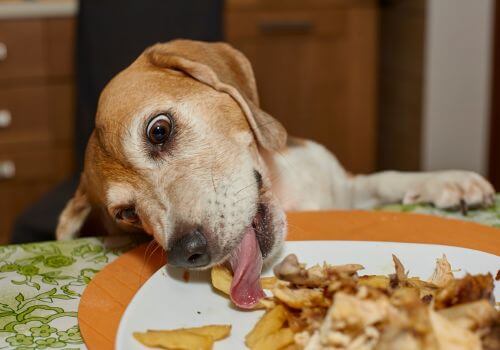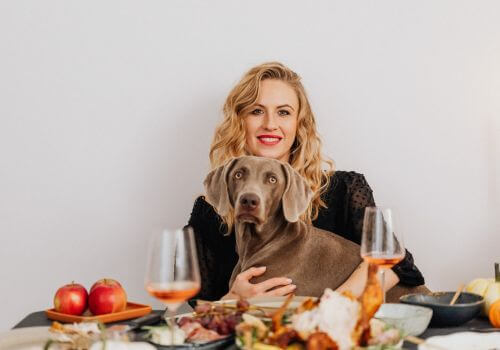Thanksgiving has a way of leaving the entire family feeling stuffed and sluggish, but if your dog is also experiencing these signs (or others, such as vomiting or diarrhea) this holiday season, don’t ignore it. Indulging in a rich, fatty meal can result in much more than an upset stomach for pets — it can cause a painful and serious condition known as pancreatitis.
Veterinary hospitals see a spike in cases of dog pancreatitis around the holidays each year when dogs are offered table scraps from meals or sneak leftovers off the counter or out of the trash. Little treats, like bits of turkey or a bite of mashed potatoes, may seem harmless but can quickly leave your dog feeling sick and develop into a case of pancreatitis.
So instead of spending your Thanksgiving frantically searching things like “What is pancreatitis in dogs?” or “My dog is sick after eating,” read on to learn all about dog pancreatitis and how you can avoid it and keep your furry friend happy and healthy this Thanksgiving.
What Causes Pancreatitis in Dogs?
As the name suggests, pancreatitis occurs when the pancreas — a vital organ that helps the body digest food and regulate blood sugar — becomes inflamed. Several factors, including obesity, certain infections, medications, toxins, and abdominal trauma, can contribute to the condition.
However, during the holidays, especially, pancreatitis is most often triggered by a sudden intake of fatty or rich foods. Even a small amount of turkey skin, gravy, or buttery side dishes can overwhelm a dog’s digestive system, causing the pancreas to release digestive enzymes too early. When that happens, those enzymes start to attack the pancreas itself, leading to inflammation, pain, and, in severe cases, systemic illness.
Because pancreatitis can progress quickly, it’s important to recognize potential triggers and avoid sharing high-fat holiday foods with your dog, no matter how much they beg at the table.
What About Pancreatitis in Cats?
While pancreatitis can be a common ailment in cats, they aren’t as likely as dogs to beg for table scraps, so there are often fewer cases of fatty-food-induced pancreatitis in cats when compared to cases in dogs during the Thanksgiving season. Because cats are often more selective eaters, their cases of pancreatitis are often triggered by things other than food, including infections, medications, and certain diseases.
However, if your cat is more of a special case and loves to swipe human food off the counter or chew on things they pull out of the trash, you should be just as vigilant with them to prevent any emergencies.
Thanksgiving Foods That Can Contribute to Canine Pancreatitis
Aside from family reunions and merriment, a big part of Thanksgiving Day is the food, which typically is rich, fatty, and definitely not diet-friendly. The biggest risk for dogs is these fatty foods that, when eaten in excess, can trigger inflammation of the pancreas, ultimately causing an uncomfortable case of pancreatitis.

High-fat Thanksgiving foods that can trigger pancreatitis in dogs include:
- Turkey skin and fatty trimmings (dark meat with skin).
- Bacon, sausage, ham, and fatty cuts of meat
- Gravy and pan drippings
- Buttery mashed potatoes and creamed side dishes
- Foods with butter, heavy cream, or cheese
Remember, anything high in fat on your table this Thanksgiving could be a trigger for pancreatitis if your dog gets hold of it!
Other Thanksgiving Foods to Keep Dogs Away From
Be sure to keep your dog away from these Thanksgiving foods that are toxic or could cause other health complications. Even when not directly causing pancreatitis, these can complicate care or require emergency visits and put a real damper on the holiday.
- Onions, garlic, and chives – Often used in stuffing or some gravies, these foods can cause red-blood-cell damage.
- Grapes or raisins – Used in deserts, grapes and raisins are both toxic to dogs and can put them at risk for kidney failure.
- Xylitol – Commonly found in some sugar-free desserts, peanut butter, xylitol is incredibly toxic to dogs and causes low blood sugar and liver failure.
- Chocolate, macadamia nuts, or alcohol — These foods are toxic to dogs and should be avoided year-round.
- Cooked poultry bones — Bones from turkeys or other meats can splinter, causing obstruction or perforation, which are major emergencies.
What Can My Pet Enjoy on Thanksgiving Instead?
Just because pets cannot enjoy a traditional Thanksgiving feast does not mean they have to be left out completely. Talk to your veterinarian about setting aside small portions of plain, well-cooked turkey (no skin, bones, or drippings), potatoes (skip the butter and gravy), or veggies, like plain carrots or green beans (not the casserole variety) instead.
What to Watch Out For: Pancreatitis in Dogs Symptoms
Pancreatitis can be an acute, one-time event or a chronic, recurring condition. Signs of pancreatitis in dogs range from mild to severe and are not always immediate, sometimes developing days after exposure to fatty foods. During the holidays, it is especially important to keep a close eye on your pet and report any changes in his behavior to your veterinarian right away.
If your dog got into any part of this year’s Thanksgiving feast, be sure to watch them closely for:
- Nausea or drooling
- Vomiting
- Diarrhea
- Loss of appetite
- Abdominal pain
- Lethargy
- Fever
- Dehydration
Some breeds, such as miniature schnauzers, are particularly prone to developing pancreatitis and may be more likely to have recurring bouts of the disease. Older and overweight animals, as well as those who have a penchant for digging around in the garbage can, also have an increased risk and should be closely monitored around food or trash cans during the holidays.
How Your Vet Will Diagnose Dog Pancreatitis
Pancreatitis in dogs is diagnosed based on each individual dog’s medical history and exam findings, as well as lab tests and diagnostic imaging.
Your veterinarian will start by asking about your pet’s symptoms and gathering a detailed history of what they ate, when their symptoms began, and what their regular diet looks like. If you know which Thanksgiving foods your dog ate during the day before pancreatitis symptoms began, be prepared to share that information with the veterinary team and be sure to mention any specific ingredients in the foods that may be a cause for concern, like those that are toxic to dogs.
After your vet has completed a physical examination and taken notes of your dog’s specific situation, lab tests will be performed to assess your dog’s pancreatic enzymes, though it is important to remember that pancreatitis is still possible if the results of these tests are normal. Your veterinarian may also recommend X-rays or an ultrasound of your pet’s abdomen to confirm pancreatitis based on their findings.
Treatment for Pancreatitis in Dogs
Early intervention is crucial for improving the prognosis for a dog with pancreatitis. Pancreatitis can progress rapidly in some dogs and go from a mild case of indigestion to something more dangerous and even life-threatening if left untreated for long enough. If your dog got into any of your Thanksgiving foods or is showing any of the signs of pancreatitis we outlined, be sure to get them examined by a veterinarian as soon as possible.
Much of the veterinary care your dog will receive to treat pancreatitis will be supportive in nature, allowing their body to heal while managing hydration and pain levels. Depending on the severity of your dog’s pancreatitis, they may be given medications to control pain, reduce inflammation, and prevent nausea and vomiting. Intravenous (IV) fluid therapy is also commonly used to help restore hydration levels and replenish any electrolytes lost due to vomiting or diarrhea.
In an effort to rest the pancreas and stop the cycle of inflammation that may cause long-lasting damage, all food and water will be withheld from your dog for 24 hours. Depending on the severity of the condition, your dog may also be hospitalized for monitoring and continued care. Following your veterinarian’s guidance and treatment plan is crucial, especially in more severe cases of pancreatitis, to ensure that no lasting damage is done to the pancreas that could cause chronic pancreatitis in the future.
As your dog recovers, bland, low-fat, and easily digestible foods will be slowly reintroduced. Once your pet has been treated for pancreatitis, it is critical to monitor their diet to prevent the problem from recurring. Your veterinarian can recommend an appropriate diet that will help you keep your pet’s fat intake in check and discuss strategies to prevent pancreatitis from occurring in the future.
How to Avoid Pancreatitis and Keep Your Dog Safe This Thanksgiving

As with many things in veterinary medicine, prevention is the best course of action. Thanksgiving and the threat of dog pancreatitis don’t have to be scary or stressful. Any holiday mishaps, like pancreatitis, can usually be easily avoided with some proper planning and a little extra vigilance.
To keep your dog safe this Thanksgiving, we recommend that you:
- Don’t feed table scraps of fatty foods. Remember, no turkey skin, gravy, drippings, bacon, sausages, butter, or cheese!
- Keep trash and plates out of reach; watch for counter-surfing guests.
- Offer dog-safe alternatives (plain, cooked lean turkey breast without skin or seasoning, cooked plain vegetables like carrots or green beans in small amounts).
- If guests want to feed treats, set aside a small, measured dog-safe treat so multiple guests don’t accidentally overfeed your pet.
- Know emergency contacts: your regular vet, nearest emergency/emergency referral hospital, or other resources like the Pet Poison Helpline (855-764-7661).
Don’t let Thanksgiving turn into a meal you and your pet will regret. If you believe your pet may be suffering from pancreatitis, contact us or your local emergency veterinary hospital right away.
Don't have a vet in your area yet? We can help you find a local veterinarian.
If you have more questions, the GeniusVets Teletriage platform will give you unlimited access to text and/or video calls with board-certified veterinarians! To learn more click here.
